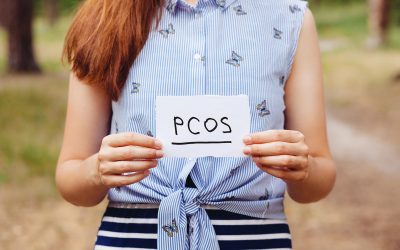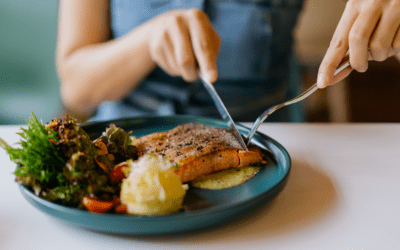I see many patients with PCOS* in my practice, and most struggle with body weight. I had one patient tell me she had gained 40 lbs. in a year with little to no change in her eating habits or exercise routine. What is it about PCOS that makes it so easy to gain weight but so hard to lose it?
It’s something called insulin resistance. When you eat foods, they are broken down into smaller molecules like glucose. Glucose comes from the breakdown of carbohydrates such as grains, breads, and sugar.
It is the main energy source for our body to run on. But when we have too much, it gets stored as adipose tissue.
Insulin is the hormone that takes the glucose out of your bloodstream and delivers it to cells in your body. In women with PCOS, the insulin molecule doesn’t seem to work as well to get the glucose out of the bloodstream. This is called insulin resistance and it’s been well documented that insulin resistance is higher in women with PCOS vs. women of similar body weight who do not have PCOS.
As insulin continues to try to do the job but fails, insulin levels rise and glucose levels rise. Eventually, when insulin can no longer do its job, glucose levels rise to the point that diabetes develops. Diabetes causes serious short and long term health complications.
Before diabetes develops, many have a condition known as pre-diabetes. The good news is that at this stage, it is reversible.
The best way to reverse course is to reduce insulin resistance through dietary changes. Reduce intake of the foods that are more easily broken down into glucose. This includes bread, pasta, rice, potatoes and most processed foods. Read food labels and avoid anything with added sugar. In place of these simple carbohydrates, increase intake of vegetables, proteins, and fats.
There are also medicines and supplements which can help insulin to work better. These include D-chiro-insitol, myoinositiol, cinnamon, and metformin.
Exercise is another excellent method to improve insulin sensitivity. Its benefit lasts 24 hours so it is important to stay active every day. I tell my patients with PCOS and pre-diabetes to focus on these 3 things:
- Reduce simple carbohydrates and increase vegetables, protein, and fats.
- Increase daily activity level/exercise.
- Consider adding supplements or medications.
Also, ask for help. Most people are more successful if they have a support network or fitness buddy.
SRM offers the Food for Fertility program twice a year. This 6-week program allows women who are overweight to come together on Saturday mornings to work on healthier eating, exercise, and comradery. Now in its fifth year, these sessions, led by Dietitian, Judy Simon and Medical Director Angela Thyer, MD, have allowed many women to reach health goals and achieve pregnancy, all while having fun in a supportive setting.
If you are interested in knowing more about the Food For Fertility program, talk to your nurse or provider at SRM, or contact Judy Simon, MS, RDN directly at https://www.mind-body-nutrition.com or 425-260-8783 to set up your initial consult.
*Polycystic Ovary Syndrome (PCOS) is a very common endocrine disorder in women consisting of irregular menstrual cycles, high levels of testosterone, and higher than average numbers of eggs in the ovaries.
Photo by: Tongle Dakum




